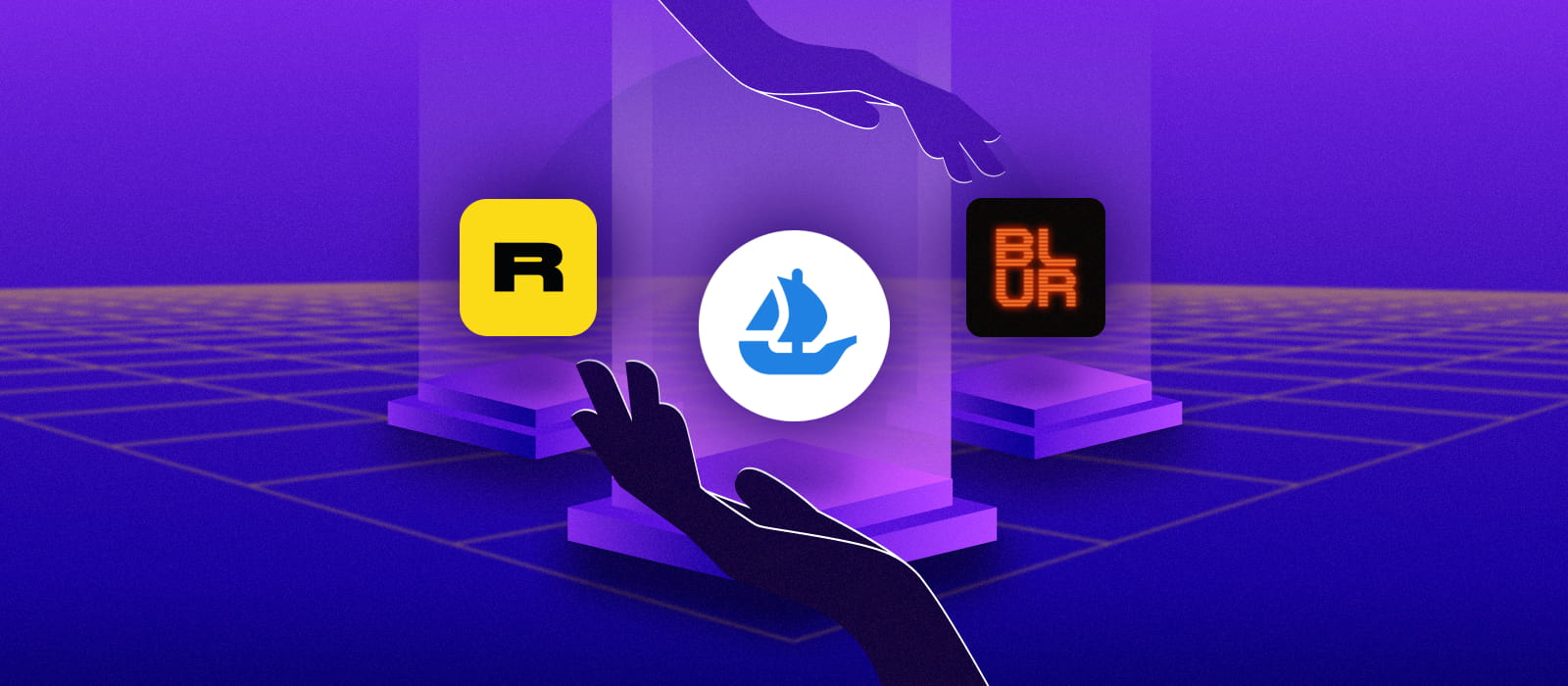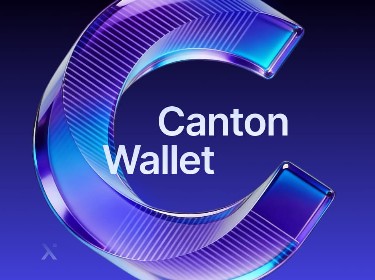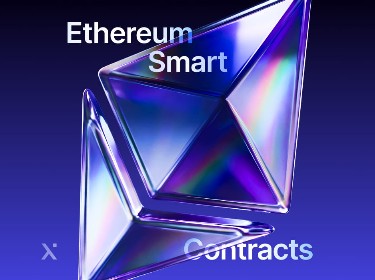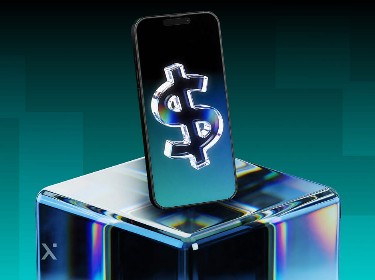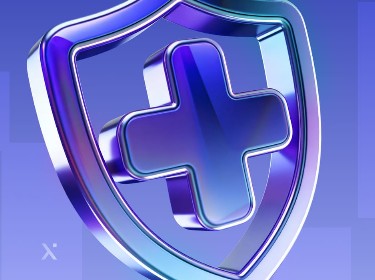Artists and brands alike create NFTs to attract new audiences and leverage a new monetization opportunity. These unique tokens are bought and sold on NFT marketplaces. But with so many platforms out there, how do you pick the right one?
Even though NFT launchpad development is not hyping as much as they were a couple of years ago, the ranks of admirers of whimsical kitties and arrogant apes are growing. October 2023 marked a notable revival in NFT interest, with trading volumes soaring to $405 million, a 32% jump from September’s figures. Overall, it is estimated that the global NFT market will reach $342.54 billion by the end of 2032.
There are numerous NFT marketplaces where you can sell and buy these unique tokens. Given the wide variety of available options, it can be difficult to choose the platform that will cater best to your interests, and, most importantly, be secure and reliable.
Today, we will examine the concept of NFT marketplaces, find out how they function, and provide you with a list of top platforms so that you can navigate them better.
But before diving further into the article, let’s refresh your knowledge about the industries that embrace NFTs — our business analyst prepared an overview of the most prominent NFT use cases in our video:
Get acquainted with top NFT use cases across industries
What are NFT marketplaces, and how do they work?
NFT marketplaces function very similarly to traditional eCommerce platforms, the only difference is in the underlying technology — blockchain. It securely records all the activity associated with an NFT, making it possible to check the history of transactions and track each token up to its creation. This helps you ensure that you’re purchasing an authentic asset.
A reliable smart contract development company also plays a vital role in the smooth and effective functioning of NFT marketplaces. They help ensure that all conditions for a transaction are met, otherwise, it is simply rejected.
On these marketplaces, users can list their NFTs for sale or enrich their collections with new assets. Tokens are sold and bought in two ways: either for a fixed price or at an auction.
For more comfortable navigation, the platforms allow you to sort NFTs by price, type, attributes, collection, or creator.
How do I use an NFT marketplace?
![]()
Most NFT marketplaces are user-friendly and quite intuitive to use. However, there are a few essentials you should have to interact with these platforms:
- Crypto wallet — NFTs are bought for crypto, so to be able to make transactions on NFT marketplaces, you should have a crypto wallet. The most popular options include MetaMask, Trust Wallet, and Coinbase Wallet.
- Crypto on balance — you need some crypto to buy, list, or mint NFTs. Most NFT transactions are made in ETH, but the marketplace you choose may have other payment options.
- User account — you need an account to mint, sell, and buy NFTs on marketplaces. To set up an account, the platform will require you to connect your wallet.
Need a thorough guide on how to sell and buy NFT? Here it is!
What are NFT marketplace gas fees?
Minting an NFT, accepting a bid, transferring ownership to someone else, and buying an NFT come with recurring gas fees.
Gas fees are measured in gwei, and the price varies based on a blockchain and its network load. At the time of writing, an average gas fee on the Ethereum-based marketplaces, such as OpenSea and Foundation, is 36 gwei or $1.49.
There are also one-off gas fees collected when you list the first NFT in a new collection and deploy a smart contract.
Some NFT marketplaces, like OpenSea and Rarible, offer lazy minting. There are two ways to execute lazy minting: a gas fee can be deferred until the token is sold and then the marketplace redeems the cost, or the fee is added to the price of an NFT and it is the buyer who pays it.
What are the benefits of NFT marketplaces?
![]()
You can trade NFTs outside of marketplaces through peer-to-peer transactions. So, why do Web3 enthusiasts choose to conduct transactions on NFT marketplaces?
Here is an overview of the key benefits NFT marketplaces offer:
Сonvenience
Interfaces of NFT marketplaces resemble familiar eCommerce platforms, making it easy to browse through different tokens and collections, list your tokens on sale, and find necessary details. Also, many white label NFT marketplace software development projects include pre-built optimized features that users and admins adapt to naturally.
Additional revenue
With NFT fashion marketplace development services, when creators sell their artworks on NFT marketplaces, they earn not just from the first sale, but also from subsequent resales via royalties. Typically, these royalties are about 5-10% of each sale’s price. Every time the artwork is resold on the secondary market, the creator automatically receives a portion of the proceeds.
Credibility
To maintain their reputation, NFT marketplaces implement rigorous token verification processes. This helps in filtering out counterfeit and scam NFTs from being listed. As a result, buyers have greater confidence in the authenticity of the tokens they purchase.
Security
NFT marketplaces typically have robust security measures to protect the platform and users against hacking and fraud, such as two-factor authentication and encryption.
Dispute resolution
NFT marketplaces help to handle disputes or issues with transactions. When a conflict arises, whether it’s about authenticity, copyright infringement, or transaction errors, these platforms typically have support teams and mechanisms in place to address and resolve such issues.
What types of NFT marketplaces are out there?
The world of NFT marketplaces is diverse, with some platforms offering various NFT types and others specializing in specific categories, such as video, music, or ASMR content. For artists and entrepreneurs looking to enter this space, specialized NFT music marketplace development services or NFT art marketplace development services are essential for creating a platform that stands out. Let’s take a look at the examples:
- Multiple categories — OpenSea, Blur, Rarible
- Art — Nifty Gateway, SuperRare, Foundation
- Music — Zeptagram, Opulous, Noizd
- Sports — NBA Top Shot, Sorare
- Game assets — Axie Infinity, CryptoKitties, The Sandbox
- ASMR — xtingles
Also, NFT marketplaces are divided into streamlined and augmented. Streamlined platforms support a broader range of NFTs and offer more limited, generic services, while augmented ones primarily specialize in niche NFTs and provide a more personalized experience.
Streamlined NFT marketplaces are more flexible — they accept both credit cards and crypto payments in Bitcoin, Ethereum, and other currencies. They offer minimal additional services and generally have a huge user base.
Meanwhile, augmented marketplaces offer more advanced services such as minting, marketing, curation, pricing recommendations, and portfolio trackers. All this entails higher transaction fees and setup costs.
OpenSea and Rarible are among the most hyped streamlined platforms, while NBA Top Shot (memorable sports moments) and SuperRare (upmarket digital art) rank first in the list of augmented NFT platforms.
Meet xtingles — a heaven for ASMR lovers powered by the Flow blockchain
Top 5 NFT marketplaces to choose from
There are plenty of NFT marketplaces, catering to any taste. According to DAppRadar, currently, the best NFT marketplaces are OpenSea, Blur, X2Y2, Immutable X, and Rarible.
Let’s take a closer look at each one to understand the key factors that contribute to their popularity.
![]()
OpenSea
OpenSea is one of the largest and most versatile NFT trading platforms. You can sell or buy more than 200 types of assets on it — artworks, game items, sports collectibles, virtual real estate, and even censorship-resistant domain names.
In October 2023, the average daily trading volume of the marketplace was more than $83.35 million. OpenSea hosts many top NFT projects such as Gods Unchained, Axie Infinity, SuperRare, Cryptopunks, and CryptoKitties.
One of the key advantages of OpenSea is its compatibility with different blockchain networks, including Ethereum, Polygon, Klaytn, Solana, Arbitrum, Optimism, Avalanche, BNB, Zora, and Base.
OpenSea issues regular updates to improve its performance. One of the major launches was the Seaport protocol which enhances the efficiency and security of transactions. Plus, Seaport unlocks the possibility to bundle different assets and exchange them for a desired NFT. For example, if a token you want to buy costs 40 ETH, you can get it for a 25-ETH NFT plus 15 ETH on top.
Our blockchain developers work with Ethereum, Solana, Cardano, Polkadot, and more. Discover how we can assist you with a decentralized project
Blur
Launched in October 2022, amidst a significant downturn in NFT hype, the Blur marketplace has swiftly advanced to the forefront and become a real competitor to the all-time leader, OpenSea. At the time of writing, the average Blur’s trading volume is $269.21 million, more than three times the volume of OpenSea.
The platform establishes itself as an NFT marketplace for pro and high-volume traders.
To make it easier for NFT enthusiasts to explore the market, Blur combines NFT listings from major platforms like OpenSea and X2Y2 and also allows its users to list their assets directly on Blur.
Moreover, the project’s ecosystem features a lending platform, Blend. It makes it possible for users to buy high-value NFTs with a smaller initial payment, thus making expensive collections more attainable.
Among the most popular NFT collections listed on Blur are BoredApeYachtClub, PudgyPenguins, Azuki, and more.
Blur doesn’t charge any fees on the sale and purchase of NFTs, allowing its users to buy all the available tokens at floor prices and then resell them for profit. Plus, the platform allows NFT creators to set a minimum royalty fee — 0.5%.
X2Y2
X2Y2 is another relatively new (launched in January 2022) NFT marketplace that has quickly become popular within the Web3 community. Its daily trading volume is estimated to be $14.64 million.
The platform offers minting, listing, selling, and purchasing of various NFTs. Yet only on Ethereum. The collections presented on X2Y2 include such famous titles as The Captainz, DeGods, Milady Maker, etc.
There are several features that attract NFT fans to X2Y2. First, the marketplace allows users to purchase several NFTs at once, thus allowing them to cut down 40% on gas fees. Second, the platform has a rarity ranking feature, allowing users to see the rarity score of a specific NFT and evaluate its value more efficiently.
In addition, X2Y2 allows for peer-to-peer lending. It works as follows: users can borrow ETH using their NFTs as collateral. If a borrower fails to repay the debt, the NFT is automatically transferred to the lender.
Immutable X
The Immutable X NFT marketplace is primarily focused on game assets, from skins and accessories to cards and lands. There, you can buy and sell items for such Web3 games as Gods Unchained, Illuvium, Cross the Ages, etc.
The key advantages of the marketplace are its carbon neutrality and zero gas fees, both for trading and minting activities. However, Immutable X takes a 2% commission fee on all primary asset sales.
A distinctive feature of Immutable X is custom royalties and the possibility to set royalty recipients on a per-asset basis. This means that different assets in the same collection can have different fees that may be distributed among up to 10 recipients.
In fall 2023, Immutable X saw 2.33K users actively trading NFTs, propelling its trading volume to $25.35 million, one of the highest compared to other NFT marketplaces.
What is carbon credit tokenization? Find out in our article
Rarible
Rarible is a multi-asset NFT marketplace, listing assets such as art, game items, music, domain names, and even NSFW (Not Safe For Work) content.
On Rarible, you can find such popular NFT collections as MutantApeYachtClub, Yogapetz, Neo Tokyo Citizen, and many more.
The marketplace supports a range of blockchain networks, including Ethereum, Polygon, Tezos, and Immutable X.
Thanks to its multi-buy feature, Rarible users can purchase multiple NFTs in a single transaction, thus significantly saving on gas fees. In addition, the platform aggregates NFT listings across several marketplaces, allowing users to select options with more affordable prices. Notably, Rarible does not impose additional fees for purchasing NFTs listed on other marketplaces.
Rarible makes its revenue through transaction fees. The platform takes 2.5% from both the buyer and the seller (5% total) for each transaction. Overall, Rarible enjoyed $1.31 million in average trading volume in October 2023, with a median price for a token being $332.
Key factors to consider when choosing the best NFT marketplace
There are some important factors you need to take into account when choosing an NFT marketplace most suitable for your specific needs, namely:
Security measures and reputation
Choose an NFT marketplace that offers strict security measures and guarantees high-level protection from vulnerabilities and fraudulent activities.
It is also a good idea to scrutinize the news and community posts to see whether the marketplace was involved in any scams and scandals. If it did, find out how the platform handled it and what security upgrades were made.
Intuitive navigation
You should feel comfortable using an NFT marketplace: easily navigate asset categories, find token details, execute transactions, etc. Look for a platform that offers a UI/UX that is both visually pleasant and intuitive.
Let our experienced UI/UX designers make your solution truly stand out
Assets
Consider the types of NFTs available on the marketplace. The diversity and quality of the tokens offered can greatly impact your experience and opportunities on the marketplace.
Fees
Understand the fee structure, including listing fees, transaction fees, gas fees, and royalties as these commissions may greatly affect the final cost of the token.
If you are an NFT creator, look for the marketplaces that allow you to set the maximum royalties. However, if you buy NFTs, it is in your best interest to choose a marketplace with no or low royalties.
Thinking about building your own NFT marketplace? Here is our detailed guide
Conclusion
Nowadays you can find marketplaces that suit any taste — some listing exclusive niche NFTs, others gathering hundreds of categories under one roof.
When choosing an NFT marketplace, remember that a good platform should be intuitive, secure, and preferably compatible with a range of blockchains and wallets.
If you have any ideas, suggestions, or queries regarding NFTs and marketplaces, don’t hesitate to reach out to us. Our blockchain consultants are ready to offer expert advice, help you navigate the complexities of the NFT space, and provide tailored solutions for your specific needs and projects.
